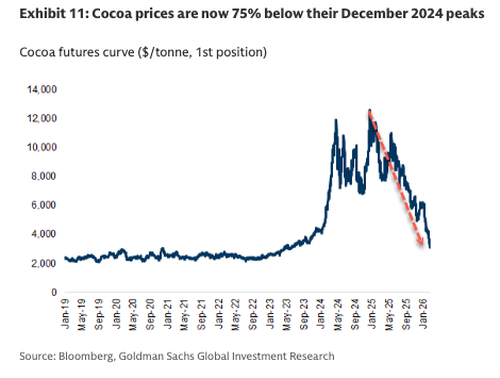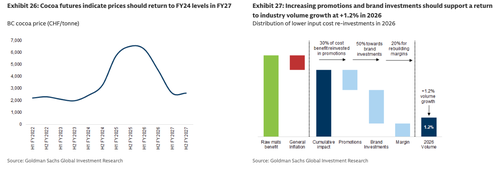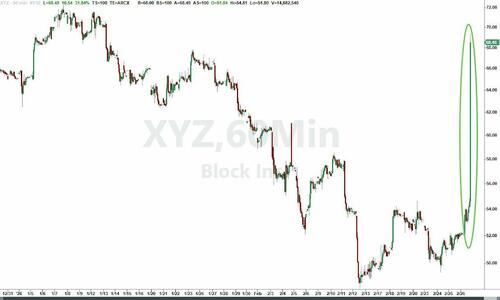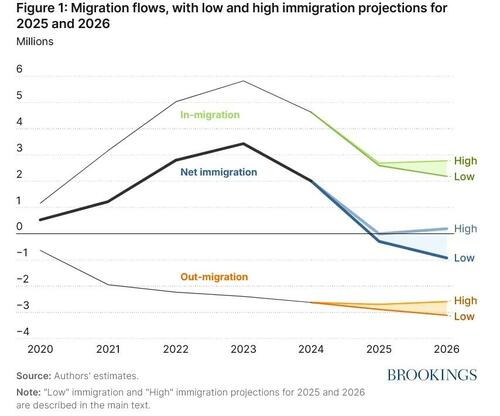Svalbard: The Other Arctic Island Flashpoint
Authored by Paul Crespo via RealClearWire,
As many focus on the world’s largest island, Greenland, and President Trump’s aggressive efforts to acquire it, another strategic Arctic island, nearby Svalbard, may be an even more likely future point of contention and conflict.

Not a conflict between the United States and Denmark, or the U.S. and NATO, but between Russia and Norway, and perhaps all of NATO.
Or maybe not with NATO. This is because Svalbard, is not just sovereign territory of Norway, but also has legally established Russian settlements dating back two centuries. And that makes Svalbard uniquely dangerous.
Svalbard, more properly an archipelago, about twice the size of Belgium, with total population of about 2,500, nominally belongs to Norway, but under the terms of the 1920 Svalbard Treaty, certain countries, including the United States, Denmark, China, and Russia have rights of access.
While Norway claims sovereignty, Russia, which has the second largest population on the islands and two long-standing Soviet-era settlements, frequently contests Norway’s claim.
This long-standing presence is one of the main justifications for the Russians laying their own claim to being the second major arbiter of what happens on Svalbard, after Norway.
And China, since 2004, now has a polar research facility, Yellow River Station, with links to its military, on Svalbard, further complicating the strategic equation.
Strategically located just 429 miles east of Greenland at its closest, Svalbard is the northernmost populated land in the world. It lies 404 miles north of the Norwegian mainland and just 621 miles from the North Pole and enjoys ice-free anchorage in the south.
My Visit to Svalbard
I visited Svalbard in June and July of 2025 for almost a month, staying in the capital Longyearbyen as well as the two Russian settlements, Barentsburg and Pyramiden. Two years earlier, Tom Cruise filmed parts of his recent film, “Mission Impossible: The Final Reckoning,” on Svalbard.
Just days prior to our visit, Norway’s 88-year-old King Harald and Queen Sonja—as well as Vladimir Putin’s trouble-making Russian Orthodox bishop Vladika Iakov, known for promoting Russian territorial claims in the Arctic—made competing visits to the island at the same time, albeit in different locations.
The Kremlin is using the Orthodox Church as a spiritual weapon to create a narrative that the Arctic belongs to Moscow. In the same vein, King Harald’s visit was also intended to demonstrate that Norway’s sovereignty of Svalbard remains solid.
Russian Presence
Today, the Russian presence is far smaller than during its Soviet-era heyday, when its two coal-mining towns, Barentsburg and Pyramiden, alone had a combined population of almost 2,500—or when Russians outnumbered Norwegians on Svalbard by nearly 2.5 to 1.
Now there are barely 500 Russians there, although their numbers are greatly outsized by their puffed-up presence.
Pyramiden is now a ghost town, boasting the world’s northernmost statue of Lenin, and a treasure trove of Soviet-era artifacts and buildings (with only a skeleton crew of caretakers, usually less than 10), while Barentsburg, still an active mining town (for now), hosts a few hundred Russians.
The Russian flag flies there, and occasionally nostalgic Soviet ones as well, and there is also a Russian Orthodox Church closely tied to Putin’s regime. There is also a heliport at Pyramiden for use by two Russian Mi-8 helicopters on Svalbard.
Barentsburg also hosts a heliport, and the Russian helicopters use the facilities at Longyearbyen Airport in the capital as well.
An unmarked black van driven by a chain-smoking Russian in a black leather mobster jacket quietly picked us up from our hotel in Svalbard’s capital on the way to Pyramiden.
When we arrived at the Russian town of Pyramiden, the hotel staff quickly noted that they already knew who I was. So much for my visit remaining under the radar.
Later, after we visited the old Russian consulate in Barentsburg, painted a mint green, now a museum, the Russian “museum guide” briskly rushed to the new secure Russian consulate just behind the old one, to the left in brick color, likely to file her report on me.
Why Svalbard Matters
While largely unknown to the general public, Svalbard is critical to global communications as it also hosts the Svalbard Satellite Station (SvalSat), the world’s largest ground-based satellite communication and tracking installation, located on a flat mountain plateau just above the capital town of Longyearbyen.
The site comprises 170 massive radio domes, radomes, containing huge dish antennae to track and communicate with satellites for everything from weather observation, maritime surveillance, navigation, and search and rescue.
In 2021, Russia complained about Norway’s satellite infrastructure, claiming the SvalSat station violated the treaty because it is a “dual-use” facility with potential military uses.
While administered by Norway, Svalbard is a demilitarized territory, The 1920 treaty prohibits the use of the archipelago for “warlike purposes.”
Only a very small Norwegian police force is allowed on the island. It is fully integrated into the Norwegian police system but operates as a specialized district.
The Governor of Svalbard has the same authority as a chief of police on the Norwegian mainland.
Svalbard Is Demilitarized
Norwegian police jurisdiction includes the entire archipelago and its territorial sea focused on environmental crime, search and rescue (SAR), and keeping public order.
However, as of 2026, the police are monitoring increased Russian intelligence activity, espionage, and potential threats to infrastructure in the region.
Of note, when I landed in Svalbard in June, I quickly noticed several fit, Russian-speaking, military-aged men in civilian clothes at the airport, with military style packs and bags. They immediately began scouting around with binoculars.
One can only speculate if they were GRU, Russian military intelligence, or something just as sinister.
Following the letter of the law in the treaty, Norwegian coast guard ships patrol the fiords for months at a time, but don’t dock.
While there, I witnessed a modern Norwegian coast guard ship, the KV Jan Mayen (W310)—the lead ship of the new class of offshore patrol boats—cruising nearby during our entire visit.
Having a lawfully allowed Russian presence on the island and being required by treaty to remain demilitarized, makes Svalbard’s connection to NATO and ensuring it falls under Alliance protection, potentially problematic.
But, just as a look at a polar projection map shows how vital Greenland is to North America, a glance at the map reveals why Svalbard’s location matters to Russia. The Kola peninsula, key to Russia’s nuclear capabilities, is immediately to Svalbard’s southeast.
The Russian Threat
Russia’s growing northern fleet is also based north of Murmansk, and Franz Josef Land archipelago, annexed from Norway by the Soviets in 1926, hosts major Russian military assets, and lies about 250 miles to the east and partly to the north of Svalbard.
Russia constructed a new air base on Franz Josef Land in 2021, publicly justifying it to defend their nuclear weapons on the Kola Peninsula. It uses its base there to threaten the surrounding areas around it, including Svalbard.
As noted by Arctic Today in September 2025:
“Russia has significantly strengthened its military presence at the archipelago. The Nagurskoye base today includes a major building complex, an airfield and powerful arms, including the Bastion system, a Monolit-B coastal radar, as well as anti-drone equipment. In a bid to intimidate Norway and its NATO allies, the Russian war ministry emphasizes that the onyx missiles are ‘almost undetectable’ for modern air defense systems and capable of ‘destroying naval vessels of any size at distances of up to several hundred kilometers.’ ...
“As part of Zapad-2025, Russia this week also conducted mock strikes with its Kinzhal missile over the Barents Sea. Also the coastal missile system Bal has been engaged, according to the Russian armed forces on Telegram.
“Launch of missile Uran from coastal missile complex Bal. Video by Russian armed forces. Large areas in the Barents Sea have been sealed off in connection with the training. Several of the areas are in the Norwegian exclusive economic zone. According to Northern Sentry, a Norwegian account on X with focus on the High North, one of the exercise scenarios of Zapad-2025 is an attack of Svalbard and subsequent occupation of the archipelago.”
Also, during the Zapad-2025 exercise, according to Arctic Today, a key target in the exercise was an imagined enemy flotilla in the Barents Sea.
The scenario included the landing of Russian troops, weapons and armored vehicles from the landing ship Aleksandr Otrakovsky, and the destruction of imagined enemy saboteurs that had infiltrated the archipelago.
Meanwhile, there have been growing tensions between Norway and Russia on Svalbard.
Growing Tensions
In January 2022, one of two key undersea fiber optic cables connecting mainland Norway to Svalbard was damaged in the Greenland Sea. The Svalbard Undersea Cable System is crucial for satellite data. Russian sabotage was suspected though never proven.
Later, in June 2022, a small crisis also highlighted how Russia could easily escalate a local incident into an excuse for military action.
Norway’s Foreign Ministry denied Russian state-owned coal mining company Arktikugol’s request to open a supply route to Barentsburg, citing sanctions on Russia over its invasion of Ukraine. Russia responded quickly.
Norway’s actions, the Russians claimed, “violated the provisions” of the Svalbard Treaty of 1920, which grants citizens of all signatory nations, including Russia, equal access to the archipelago’s resources.
“Following Norway’s actions, the sovereignty of this country over Svalbard is a big question from now on,” Russian Senator Andrei Klishas said.
Norway’s Foreign Minister denied that Oslo had violated the Svalbard Treaty, saying the shipment “has been stopped on the basis of the sanctions that prohibit Russian road transport companies from transporting goods on Norwegian territory.”
The next month, Norway allowed the goods to be shipped to Barentsburg, relieving the immediate tension.
Still, Russia’s recent rhetoric suggests Svalbard may be a growing target in Moscow’s sights.
In 2023 Russian officials ramped things up and skirted the letter of the law of the 1920 treaty by holding a military style parade down the main street in Barentsburg, including flying a helicopter overhead.
The blatantly militarized display created a lot of concern in Norway.
China Also Eyeing Svalbard
But Russia isn’t the only threat to Svalbard. China, now closely allied to Russia, has been showing increasing interest in Svalbard, and the High North in general, calling itself a “near-Arctic” power.
The Chosen recently reported how the Chinese, who have a had a polar research station on the island for 20 years, are aggressively trying to infiltrate Svalbard as well, and how Norway has responded:
“In July 2024, controversy arose when cruise tourists from Shanghai and Hong Kong took photos saluting in military uniforms while waving Chinese flags in front of a granite lion statue at a Chinese base within the Svalbard archipelago. Despite repeated orders from Norway, China has not removed the [two] statue[s].
“Norway has implemented control measures, including prohibiting foreign sales of private property in Svalbard and denying Chinese students permission to study at local universities on security grounds. It has also restricted voting rights previously allowed to foreign residents, permitting them only if they have resided in mainland Norway for over three years. State Secretary Eivind Vad Petersson stated, ‘No country grants voting rights to foreigners. The Svalbard Treaty guarantees ‘equal access’ but not ‘equal rights.’”
Meanwhile, members of the U.S. House Select Committee on the Chinese Communist Party believe the Chinese, who have access to a powerful radar system that monitors space weather and the atmosphere, are performing military research on Svalbard, which is not allowed under the treaty.
According to an online portal, at least three current research projects using data gathered from on Svalbard have been shared with the China Research Institute of Radiowave Propagation, a Chinese defense organization.
So, China is now also showing a growing, likely military, interest in Svalbard, making it part of the new Cold War occurring in the far north. And potentially the next crisis flashpoint in the Arctic.
Tyler Durden
Thu, 02/26/2026 - 23:25




 Illustrative file image: Reuters
Illustrative file image: Reuters

 File image: USAF/Anadolu
File image: USAF/Anadolu

 Korean Central News Agency/Korea News Service via AP
Korean Central News Agency/Korea News Service via AP
 Russian MFA file
Russian MFA file U.S. Trade Representative Jamieson Greer at the White House in Washington, DC. Reuters/Kylie Cooper/File Photo
U.S. Trade Representative Jamieson Greer at the White House in Washington, DC. Reuters/Kylie Cooper/File Photo
 Japanese Prime Minister Sanae Takaichi raises her fist as U.S. President Donald Trump speaks aboard USS George Washington on Oct. 28, 2025, in Yokosuka, Japan. Tomohiro Ohsumi/Getty Images
Japanese Prime Minister Sanae Takaichi raises her fist as U.S. President Donald Trump speaks aboard USS George Washington on Oct. 28, 2025, in Yokosuka, Japan. Tomohiro Ohsumi/Getty Images



 Oil facilities on Kharg Island in the Persian Gulf about 1,250 km south of Tehran, NurPhoto
Oil facilities on Kharg Island in the Persian Gulf about 1,250 km south of Tehran, NurPhoto



 The logos of Google, Apple, Facebook, Amazon and Microsoft displayed on a mobile phone and a laptop screen. Justin Tallis/AFP via Getty Images
The logos of Google, Apple, Facebook, Amazon and Microsoft displayed on a mobile phone and a laptop screen. Justin Tallis/AFP via Getty Images
 The refinery El Palito in Puerto Cabello, Carabobo state, Venezuela, on Jan. 22, 2026. Ronaldo Schemidt/AFP via Getty Images
The refinery El Palito in Puerto Cabello, Carabobo state, Venezuela, on Jan. 22, 2026. Ronaldo Schemidt/AFP via Getty Images
Recent comments